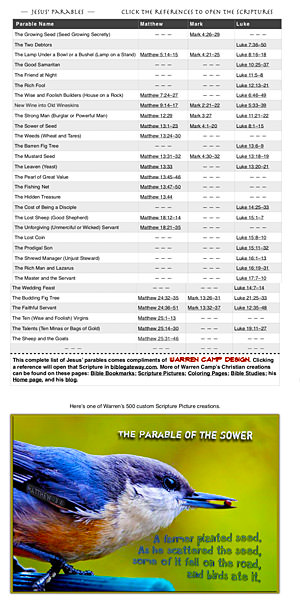In Matthew 25, Jesus tells the story of three servants who were given bags of gold to increase their master’s wealth. While this parable has numerous interpretations of its meaning, I’ll focus on how God, in this “judgment” and “stewardship” parable, encourages us to utilize wisely those gifts with which he’s entrusted us.
— Preview —


Incidentally, Jesus spoke about the heaven-or-hell judgment more than anyone else in the Bible and in a very specific way. More than half of the parables that Jesus told relate to God’s eternal judgment of sinners.
Click the list or the “bird” to enlarge and use Warren’s list of forty-four of Jesus’ parables (a PDF file with links to Scriptures).
par•a•ble [noun] a simple story used to illustrate the meaning of or a moral or spiritual lesson, as told by Jesus in the gospels
synonyms: allegory, moral story/tale, fable
Jesus’ Parable of the Talents (or Bags of Gold)
Matthew 25:14–30
The Parable of the Bags of Gold is also called the Parable of the Talents in a number of versions. Found in Matthew’s gospel, it’s often mistakenly assumed to be Luke’s gospel version of the same parable, titled the Parable of the Ten Minas (Luke 19:11–27). Actually, they’re two different parables. While both deal with wise stewardship, when we realize the context in which Jesus spoke each, we distinguish the two as unique stories that Jesus told in different locations, to different people, for different reasons. See here why these are two different parables.
Having distinguished the two, I’ve included my summary of the Parable of the Ten Minas within the “God’s Kingdom” collection of parables, while putting this summary of the Parable of the Bags of Gold in the “Judgment” category (as shown on the Hearty Boys “Parables” home page).
Before we dig deeply into the text and meaning of this parable, we must first put it into context. The Parable of the Bags of Gold begins with, “Again, it will be like...” When we read the previous parable in Matthew’s account — The Parable of the Ten Virgins (25:1–13) — we see that Jesus had been in the middle of a discussion about the kingdom of God and the importance of being prepared for the return of Christ (the bridegroom). The message of that parable was basically this: Even though Jesus has taken a long time to return, we must not forget about him or fail to continue to follow him. Jesus tells us how we’re to live, following his ascension to heaven and prior to his return to earth. Today we’re in that in-between time of waiting for his return.
This animated video comes compliments of RodTheNey
The Parable of the Bags of Gold (or Talents)
This parable fits into that section of Scripture that constitutes Jesus’ final warnings, prophecies, and encouragements to his people, prior to his departure. Matthew’s account tell us that Jesus, being Israel’s Lord God — Yahweh — will leave them for an undisclosed period of time. He’ll delegate to them the responsibility, as stewards, to judge wisely as how to care for his valuable kingdom. The Parable of the Bags of Gold impresses on the Israelites the weight of that responsibility and the serious consequences they’ll face if they neglect to understand and apply his instructions wisely and appropriately. Within this parable there’s also a message to all of mankind, then and today.
The Parable of the Bags of Gold
14 “Again, it will be like a man going on a journey, who called his servants and entrusted his wealth to them. 15To one he gave five bags of gold, to another two bags, and to another one bag, each according to his ability. [See note about “talents.”] Then he went on his journey. 16The man who had received five bags of gold went at once and put his money to work and gained five bags more. 17So also, the one with two bags of gold gained two more. 18But the man who had received one bag went off, dug a hole in the ground and hid his master’s money (Matthew 25:14–18).
It’s important to appreciate the fact that, if the bags are filled with gold, the value of what the master had entrusted to the stewards would have been immensely high, in the millions of dollars. Since the Lord used only the term “bags of gold,” we can make only educated assumptions. However, it appears likely that the owner of the gold-filled bags, who was to travel to a distant country, was a wealthy man. Given the extent of his wealth, he entrusted a portion of his assets to three men who became stewards of them.
The first servant received five bags of gold, while the second received two bags, and a third received one bag. Each had been given a considerable amount of money with the responsibility to manage and care for that money. Each servant must have known the personality and character of the wealthy man. He expected them to know him well enough to accept the responsibilities associated with wise stewardship, thereby devotedly applying the spirit of his well-intended instructions.
This parable’s “servants” became “stewards.” Then and today, one’s stewardship efforts will reap a range of rewards: Those who manage their possessions wisely become richly rewarded. Those who aren’t good stewards receive severe judgment.
The Greek for “servant” is douloi, which describes “a bondslave who is bound to do what he is told to do, regardless of what he thinks about it.” They were the property of the master who had the ability to dispose of them as he pleased. This parable’s first two servants did as they were directed, while the third servant, despite being bound to follow the master’s directives, intentionally refused to follow orders.
So, Jesus tells us in v. 15 that each servant was given a quantity of gold bags “according to his ability” to be a wise steward. The first two servants had a good ability to understand the spirit and letter of the master’s instructions, as well as appreciate the wealthy man’s character. Both used the resources that they’d been given by “putting his money to work” to gain a profit.
19“After a long time the master of those servants returned and settled accounts with them. 20The man who had received five bags of gold brought the other five. ‘Master,’ he said, ‘you entrusted me with five bags of gold. See, I have gained five more.’
21“His master replied, ‘Well done, good and faithful servant! You have been faithful with a few things; I will put you in charge of many things. Come and share your master’s happiness!’
22“The man with two bags of gold also came. ‘Master,’ he said, ‘you entrusted me with two bags of gold; see, I have gained two more.’
23“His master replied, ‘Well done, good and faithful servant! You have been faithful with a few things; I will put you in charge of many things. Come and share your master’s happiness!’ (vv. 19–23)
Upon the wealthy man’s return, he learned that the ones who’d been given five and two bags had doubled their charge; each of them made a 100-percent profit! The profitable stewards were praised, given increased responsibilities, and invited to enter into the joy of their Lord. On the other hand, the servant who’d been given one bag chose to dig a hole in the ground and bury it, gaining nothing for his master. Fear and mistrust of his master was what motivated the third servant. He buried the money in the earth and returned the original amount without having gained any interest. The untrusting servant was scolded, rejected, and punished.
Evaluating “returns on investments,” the reward given to those who increased their investment focus and efforts included praise from their master and rulership “of many things.” They were ushered into the joyful future that he’d prepared for them. Alas, for the third man, and those of us today who fail to invest wisely in what God provides each of us, will suffer dire consequences.
24“Then the man who had received one bag of gold came. ‘Master,’ he said, ‘I knew that you are a hard man, harvesting where you have not sown and gathering where you have not scattered seed. 25So I was afraid and went out and hid your gold in the ground. See, here is what belongs to you’ (vv. 24–25).
What does it mean when the third man called the master “a hard man, harvesting where you haven't sown and gathering where you haven't scattered seed”? He had a very low opinion of the master. In Jesus’ parables, “Master” is usually symbolic of God, sometimes suggesting how God will deal with people in his parables. In effect, what the third servant said of his master was “You’re cruel and you benefit from other people’s labor, harvesting where you have not sown and gathering where you have not scattered seed.” Clearly, that servant was resentful. In his opinion, as a servant, his master continually benefited from the work of others. That’s to say that someone else had planted seeds, while the Master followed up and harvested the cultivated crops.
In a way, that’s what the parable’s master was doing, wasn’t it? He planted seed by giving each servant a sum of money before he departed on his trip; two servants performed appropriately and wisely as stewards by putting the money to good use, thereby gaining a return on their investments until the master came back to settle the accounts.
But the third servant forgot that everything he'd been given had belonged to the master. His heart apparently became jealous of whatever glory the master would have received from his labor. And he might have whined: Hey! How is that just? What an audacious complaint coming from a man who clearly had been trusted greatly and allowed to be a partner in what the master would do. In effect, the master willingly gave the money to the three servants, allowing each to use it to increase their talents and skills. He wanted to work with and rejoice with his servants as a result of their successful investments. But the third servant could see only the negative aspects of such engagement, so he painted the master in a bad, selfish, cruel, hard light.
Today, what successful CEO wouldn’t expect to completely entrust his company’s welfare to subordinates? And then, what subordinate would complain that the CEO had profited from his or her having worked hard for the CEO? Isn’t that the essence of a successful business transaction?
Can you imagine the consequence for the one who did nothing wise with the valuable resource that he’d been given?
26“His master replied, ‘You wicked, lazy servant! So you knew that I harvest where I have not sown and gather where I have not scattered seed? 27Well then, you should have put my money on deposit with the bankers, so that when I returned I would have received it back with interest.
28“‘So take the bag of gold from him and give it to the one who has ten bags. 29For whoever has will be given more, and they will have an abundance. Whoever does not have, even what they have will be taken from them. 30And throw that worthless servant outside, into the darkness, where there will be weeping and gnashing of teeth’ (vv. 26–30).
It’s worthwhile to realize the context in which the master’s resources could have gained interest while he was away (v. 27), if the servant had put the money in a bank rather than the ground. When “interest” (or “usury”) is used in the Bible, it’s quite frowned upon. It was seen as a cruel way to exploit the needs of less-fortunate people. Israelites were prohibited from lending to one another and collecting interest. God pointed out how quickly this resulted in permanent debt and oppression (see Exodus 22:25–27; Leviticus 25:35–37; Deuteronomy 23:19–20; Nehemiah 5:10–11; Psalm 15:1, 5; Proverb 28:8; Ezekiel 18:13, and so on).
What the master was saying here is: Well, if you thought I was such a cruel taskmaster, you should have done something cruel with my money by investing it with bankers. If you think that what I do is act harshly and lazily while I benefit from other people’s efforts, then that’s exactly how you should have used my money — to exploit people by charging interest! But you didn’t even do that! Basically, the master had trapped the lazy servant through his own faulty logic.
His valuable bag of gold was not only taken from him, it was given to the steward who’d already been rewarded handsomely! We see that reward in a statement similar to what appears in previous verses: “Whoever does not have, even what they have will be taken from them” (v. 29). The third servant had been generously entrusted with the master’s resources; he was to use and multiply them through wise investment efforts. But instead of investing and multiplying the provided resources by doing something creative and helpful for the master, the servant buried it out of fear and spite, while those who acted responsibly gained much from their efforts.
Hearty Ways to Apply This Parable
The application of this parable must be understood within the context of the message of Matthew 24–25. First, it was a message that Jesus directed to the people of Israel who’d live in the last days before the Lord returns. The statement, in 24:13, “but the one who stands firm to the end will be saved,” is a key statement; it refers today to the remnant of people who, because they believe in Jesus, will receive the promised kingdom.
How this parable applies to the people of Israel is graphic and relevant: Those who’d believe him will be rewarded in his kingdom. The basis of their reward would be based on the extent of their wise stewardship of his valuable resources that he graciously entrusted to them. Those who became and remained fearful, choosing to not believe in him, would be rejected and judged harshly. The message is the same for us today.
Within this judgment parable we should also see a universal application to all mankind. From the time of man’s creation, each individual has been entrusted with valuable resources of time and material wealth. Everything we have comes from God and belongs to him. As a result, we become responsible for using those resources so that they increase in value. We Christians also have at our disposal the most valuable resource of all — the Word of God. If we believe and understand him, and apply his Word as good stewards, we become a blessing to others so much so that the value of what we do multiplies. There’s no denying it: We’re accountable to the Lord for the God-honoring utilization of his valuable resources.
Closing Questions for Your Consideration
So, how are we to behave while Jesus isn’t yet physically here with us on earth? To correctly answer that question, we need to answer other preliminary questions: What do the bags of gold represent? Our money and financial assets? Our time? Perhaps our talents, skills, and resources? Might those bags of gold represent our responsibilities to our Provider, Jehovah-Jireh? What specifically has God entrusted to us that we’re to take responsibility for and handle well, while he’s away?
Because this is a judgment-specific parable about stewardship, the lingering questions remains: How are we Christians to manage and increase what God has provided for us to care for and manage? How are you doing today with your stewardship priorities and efforts? Are you now gaining a 100-percent return on your investments?
Closing "Accountability to God" questions Are you living as if what you do today will effect you in eternity? Do you assume that, since your eternal destination is secure, you can relax and wait for heaven's arrival?
Be aware that that's not what this parable teaches! Yes, heaven is secure for those who've truly repented and believe that Christ's death pays their sin debt. But the way we live matters. When Jesus returns, we'll have to give an account of what we've done with whatever he's entrusted to us.
What's at stake isn't our salvation but our rewards. As in the parable, God entrusts each of us with talents according to our individual abilities. Everything we have is a gift from the Lord: our time, skills, treasures, spiritual gifts, work, relationships, and his Word. Are you investing each and every one of these in a way that will result in commendation from Christ when you stand before him?
“And throw that worthless servant outside, into the darkness, where there will be weeping and gnashing of teeth” (Matt. 25:30).


